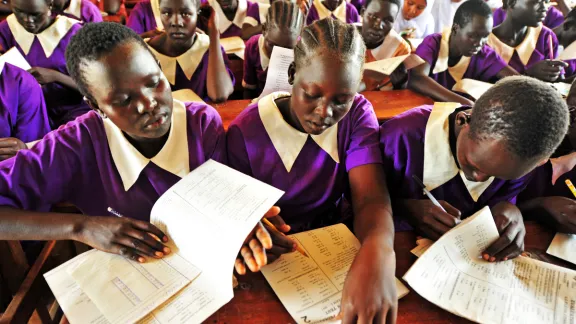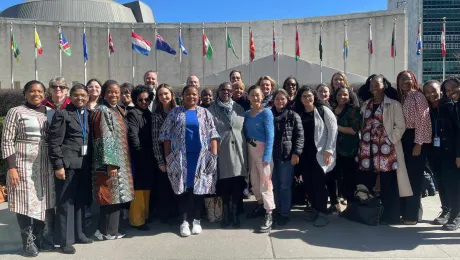
ALP students at Bahr El Naam Girls Primary school in Kakuma refugee camp, Kenya. Photo: LWF/ C.Kästner
LWF Accelerated Learning Program supports students from conflict zones
Rose Imoya Banner is what the little girls call a “big mama”. At the age of 24, the young woman is not only an exception from the other students of the Bahr El Nahm primary girls school in Kakuma refugee camp. Even in the group of over-age learners, she is a senior.
Unlike her peers however, she does not mind the teasing as much, because it is true: Banner is already a mother of two and more than grateful for the opportunity to catch up on missed education. “I want to be educated, also for my children,” she says. Her older child, a boy aged six, already started primary school.

Rose Imoya in the school yard. All photos LWF/C.Kästner
Conflict and education
The Lutheran World Federation (LWF), in charge of education at Kakuma refugee camp, has introduced the “Accelerated Learning Programme” (ALP) in September 2016 to accommodate the needs of young people from conflict areas. Many of them are teenagers when they arrive in the camp, but have not been able to attend school regularly due to conflict and displacement. Trying to catch up on the education they missed, they share classrooms with seven- and eight year olds - a difficult learning situation for all students.
The ALP combines those students in special classes. With peers their own age, they cover the curriculum of two primary school years in one calendar year. In the end they sit the national primary school exams and hopefully are able to join students their own age in secondary school.

Overcrowding is a problem in all schools in Kakuma.
“They are very smart and motivated, and do extremely well at the national exams,” Lillian Cherotich, the head teacher at Bahr El Nahm, says. The official results of the primary exams prove her right - the students from the LWF schools in Kakuma are usually among the top ten in the country.
Crowded and under-resourced
The schools have a good reputation, enrolment is high. Which is surprising considering the learning conditions in Kakuma. Turkana region where the camp is located is extremely hot. Even in winter time, the thermometer reaches 30 degrees Celsius. In the summer it goes up to 50 degrees. During the rainy season flooding washes away the houses, there is never enough of water and food. The schools meet this need with a feeding programme - at noon, all students receive free porridge.

Students enjoy a cup of free porridge at the lunch break.
Classrooms are overcrowded to a degree where teachers and students have difficulty interacting with each other. “We have 138 students in one classroom, it’s often impossible for the teacher to move in class, the head teacher says. We urgently need more textbooks, more pencils, more desks,” she adds.
Schoolwork and child care
The 464 ALP students are no exception, they share three classrooms - about 140 in each. But they face additional challenges, as the head teacher has observed. Many are already heads of households – they are the oldest of a group of siblings and have to take care of their families. “These students are often absent”, Cherotiut, says. “They have to go and pick food rations, or stay at home when a sibling is sick.”
Although there are refugees from 23 countries living in Kakuma, the majority of the ALP students like Banner come from South Sudan. “40 percent of the South Sudanese learners in our schools are over age, in some schools it is even half of them,” the teacher says. “The students often talk about the war.”
In South Sudan, early marriage is common, and unlike Rose Banner, the girls usually do not return to school once they are married. Banner struggles to manage child care and school work: “I leave my children at home in the care of relatives, but there is no time to revise school work when I get home,” she says.

ALP students at Bahr El Naam Girls Primary school in Kakuma refugee camp.
The single mother has to fetch water, sometimes from kilometers away, and prepare meals. She might have to supervise her older child’s homework. “Sometimes, when I have electricity, I study at night.”
Give something back
With the current teacher-student ratio it is hard for the teachers to support students like Banner, but study groups among the ALP students and their motivation make up for a lot. Banner appreciates her second chance at getting an education, realizing that this would be impossible in her home country. “I receive so many things here in Kakuma. I can go to school - I do not think that would be possible anywhere else,” she says.
Despite being behind so many years, she is determined to also finish secondary school when the time comes. “I want to get a job, maybe as a teacher,” she says. “We have so many people who are still uneducated. Like I was taught, I want to teach others.”
The LWF Accelerated Learning Programme is funded by the European Union (ECHO). In 2016, 100 ALP students graduated the national primary exam in Kakuma. Currently, 464 over-age learners are enrolled.
LWF funded by ECHO also runs ALP in refugee camps in South Sudan and Djibouti.


